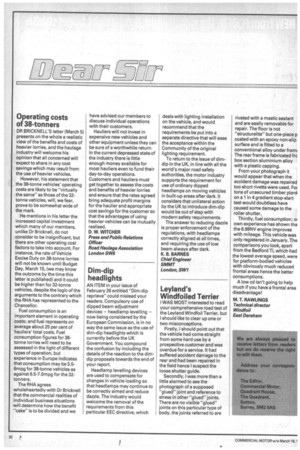Operating costs of 38-tanners
Page 34

If you've noticed an error in this article please click here to report it so we can fix it.
DR BRICKNELL'S letter (March 5) presents on the whole a realistic view of the benefits and costs of heavier lorries, and the haulage industry will welcome his opinion that all concerned will expect to share in any cost savings which may result from the use of heavier vehicles.
However, his statement that the 38-tonne vehicles' operating costs are likely to be "virtually the same" as those of the 32tonne vehicles, will, we fear, prove to be somewhat wide of the mark.
He mentions in his letter the increased capital investment which many of our members, unlike Dr Bricknell, do not consider to be insignificant, but there are other operating cost factors to take into account. For instance, the rate of Vehicle Excise Duty on 38-tonne lorries will not be known until Budget Day, March 15, (we may know the outcome by the time this letter is published) and it could be higher than for 32-tonne vehicles, despite the logic of the arguments to the contrary which the RHA has represented to the Chancellor.
Fuel consumption is an important element in operating costs; and fuel represents on average about 25 per cent of hauliers' total costs. Fuel consumption figures for 38tonne lorries will need to be assessed in the light of different types of operation, but experience in Europe indicates that consumption may be 5.56mpg for 38-tonne vehicles as against 6.5-7.0mpg for the 32tonners.
The RHA agrees wholeheartedly with Dr Bricknell that the commercial realities of individual business situations will determine how the benefit "cake" is to be divided and we have advised our members to discuss individual operations with their customers.
Hauliers will not invest in expensive new vehicles and other equipment unless they can be sure of a worthwhile return. In the current depressed state of the industry there is little enough money available for most hauliers even to fund their day-to-day operations. Customers and hauliers must get together to assess the costs and benefits of heavier lorries and ensure that the rates agreed bring adequate profit margins for the haulier and appropriate cost savings for the customer so that the advantages of using heavier vehicles can be mutually realised.
D. W. WITCHER Press and Public Relations Officer Road Haulage Association London SW6












































































































